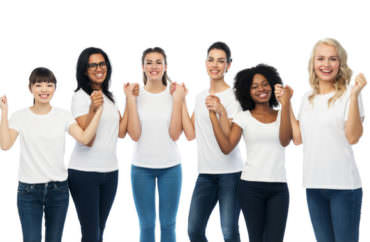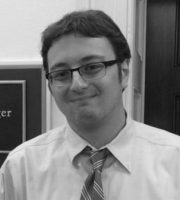
Overwhelmingly white female audience
WASHINGTON, DC – American University has dealt with bananas hung from nooses, posters urging women to “make me a sandwich” and contrarian feminists in the past several months.
In an effort to make sure that its students, staff and faculty can respond to such challenges to inclusivity, the private institution’s Center for Diversity & Inclusion hosts occasional voluntary workshops.
I attended one Wednesday titled “Creating Inclusive Communities.” From defining “allyship” to “microaggression” to “intersectionality,” this event could have taken place at nearly any campus nationwide.
Led by Shannon Smith, the center’s assistant director for student success, and the business school’s director student development, Andrew Toczydlowski, this interactive class opened with participants identifying ourselves and our preferred pronouns, both of which were written on our nametags.
Eight of the 10 participants were women, all but one was white and all identified with their birth sex.
‘Understand your privilege’ to ‘increase your allyship’
The discussion took place at several tables in a glass-enclosed room in the student center. I sat with three others, including two self-identified professors. Perhaps surprisingly, no one specifically discussed the campus racial and gender controversies of 2017.
The themes of the workshop appeared to contradict each other: Participants were told in one breath not to “stereotype,” and in the next they were assigned various forms of “privilege” based on stereotypical traits.
The facilitators, both self-identified men, gave us a worksheet that advised us to “understand your privilege” as a way to “increase your allyship.”
American University “Allyship” worksheet from “Creating Inclusive Communities” training by The College Fix on Scribd
MORE: AU cancels ‘unsafe space’ event ‘at the last minute’
But Smith said we must have an understanding of our identities before engaging with others, and that we should be careful of stereotyping.
“Your identities are not separate,” Smith said, explaining intersectionality. “You may be a student, you may be a parent, you may be a part of this religion, and you may be of this socioeconomic status. Those do not exist independently of each other.”
For example, Smith said, “I’m a black assistant director from the South that has an education degree beyond college. So, at no point am I truly able to just enter a space and say ‘I’m solely only a black male.’”
Everyone sees the world through an intersectional lens even if they don’t realize it, according to Smith: “You’re looking through that lens from this situation based upon possibly my gender, my background, where I’m from, my education level. This is putting this all into perspective.”
Toczydlowski echoed Smith’s sentiment. “The identity I think about most here in DC is the fact that I’m white,” he said. (The city’s population dipped below majority-black in 2011 for the first time in five decades.)
“The identity that I’m always thinking about back home in rural upstate New York is the fact that I am not religious,” Smith continued: “Depending on the context of what identity you’re thinking about the most is that it might change.”
The participants answered written questions including “Which identity or identities do you think about the most? Why? How?” and “When has someone stereotyped you or made assumptions about you based on one of your identities? How did it make you feel?”
Each table then discussed among themselves how they identify. (Participants did not give their surnames.)
MORE: AU blocks whites from cafe designated ‘sanctuary’ for nonwhites
“The first things that came to mind were gender, race, and sexual orientation,” professor Mary said at my table:
I probably think about race now more now than ever before given the rising incidents of overt racism in our country. So that’s made me in past couple of years think more about using my privilege for some kind of social justice. … In my identity, I think about my educational attainment and my profession. That makes me who I am.
The discussion transitioned to conceptually discussing inclusion, whether it be social, economic, educational, or any category that can serve as a kind of barrier.
Maria talked about the barriers she has felt as a student, particularly “not being able to access certain opportunities because of financial limitations here at AU or at least feeling pressured [that] you have to do exactly that.”
She said she feels pressured to get an internship: “[N]ot everyone can access an internship that’s unpaid – like, most of them are unpaid.”
As a group, only whites can be racist?
The workshop included an introductory discussion of microaggressions, though participants already seemed familiar with the concepts and accepted them uncritically.
An example is asking people who don’t look American where they are from. “Oh, I’m from Detroit,” Smith said hypothetically. “But then there’s, ‘Yeah, yeah, where you really from?’”:
There’s a message there because, one, what do we mean by that? Two, what does that mean to that person because are you “othering” that person, to an extent, to make the other person say “I am from Detroit, but I was born and raised in Detroit”? What does that mean to them?
He concluded, “What does that comment mean? Does that mean you are different from me?”
American University “Creating Inclusive Communities” packet by The College Fix on Scribd
MORE: AU says bananas are racist threats
When I asked Toczydlowski to differentiate between overreacting and feeling legitimately “microaggressed” in response to a situation, he responded that “context is important.”
He gave an example of someone meeting an African American and saying first, “Wow, you are so well spoken!”
“That’s not appropriate,” he explained. “But if I’m in the context of my job and a student has just auditioned to be the commencement speaker, and I say, ‘Wow, you’re really well spoken,’ there’s a difference there.”
When the tables gathered together again, the participants were asked what they plan to do to be inclusive.
The only nonwhite participant said she feels that just as she “hold[s] white people accountable for racism … I feel like I have to also be committed to holding myself accountable for colorism in the black community as well as other people of color.” (Colorism is the practice of “prejudice or discrimination” within an ethnic group against those whose skin is darker.)
The female student did not say she held black people as a group accountable for racism, however.
That seemed to be the underlying theme of Wednesday’s discussion: All individuals can show racism, but only whites are responsible for institutional racism.
Members of the university community who missed Wednesday’s discussion can attend several related workshops this academic year. They include “Safe Space: Understanding LGBTQ Identities,” “Trans 101,” “Unmasking Your Privilege” and “Paving the Way: Supporting First-Generation College Students.”
MORE: ‘Anti-feminism’ posters investigated as ‘hate crime’
IMAGE: Syda Productions/Shutterstock
Like The College Fix on Facebook / Follow us on Twitter





Please join the conversation about our stories on Facebook, Twitter, Instagram, Reddit, MeWe, Rumble, Gab, Minds and Gettr.